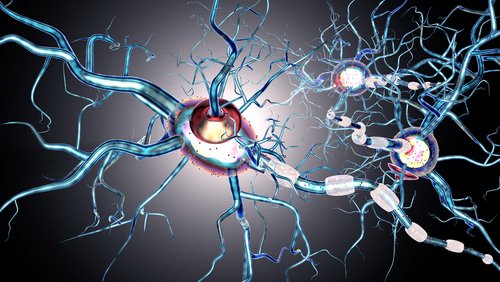Striatal Neurons Require Functional Huntingtin Gene to Survive and Maintain Connections, Mouse Study Finds
Written by |

Neurons in the striatum — a brain region responsible for motor control — require a functional huntingtin (HTT) gene to survive and remain healthy during aging and to allow proper communication between nerve cells, according to a mouse study.
The study, “Striatal Projection Neurons Require Huntingtin for Synaptic Connectivity and Survival,” was published in the journal Cell Reports.
Patients with Huntington’s disease have a faulty copy of the HTT gene, resulting in the production of a mutated huntingtin protein. This abnormal protein is toxic to nerve cells in the brain (neurons), particularly to those found in the striatum (striatal neurons).
As the disease progresses, striatal neurons gradually degenerate and eventually die, a hallmark of Huntington’s disease.
In addition, over time, abnormal forms of the huntingtin protein may possibly interfere with the activity of the remaining normal huntingtin protein in these neurons, further hampering their health and normal function. However, the exact role of huntingtin in these cells is still unclear.
“We hypothesized that the normal huntingtin gene plays a critical role in neuronal health and connectivity, and we wanted to determine what happens to striatal neurons that have had huntingtin eliminated,” Cagla Eroglu, PhD, an associate professor and the co-director of Regeneration Next Initiative at Duke University and lead author of the study, said in a press release.
For the study, researchers used genetic engineering to delete the HTT gene specifically from striatal neurons in young mice. These animals, which were unable to produce the huntingtin protein in their striatal neurons, had motor impairments and displayed a set of behaviors resembling those seen in patients with Huntington’s.
Striatal neurons that lacked huntingtin began to die as animals got older, and their ability to maintain functional synapses — the junction between two nerve cells that allows them to communicate — was compromised. This could explain why these animals had a series of motor impairments.
The researchers also found that the animals began to show signs of motor impairments before striatal neurons were destroyed, suggesting that neuronal cell death is not the only factor contributing to these symptoms.
“We believe changes at the neuronal and synapse level happening before cell death are contributing to the progression of the disease,” said Caley Burrus, a PhD student in Eroglu’s lab and first author of the study.
Therefore, treatments that seek to restore synapse functionality may prove to be helpful for those with Huntington’s. The team led by Eroglu is now continuing research in this area with the goal of developing therapies that specifically target synapses.
“Understanding the critical roles huntingtin plays in neurons is essential to designing therapies that will help individuals with Huntington’s disease in the safest and most effective way possible,” Eroglu said.
An important implication of this study is the discovery that the normal version of huntingtin is crucial for brain health.
Current therapies that block the production of all versions of huntingtin — including Roche’s IONIS-HTTRx, which is currently being tested in a Phase 3 trial (NCT03761849) and in its open-label extension study (NCT03842969) — could have implications in brain health.
“Although several studies in rodent and non-human primate models have shown that Htt knockdown in adult animals is not harmful, one study found that Htt deletion in the adult mouse leads to brain atrophy, extensive reactive gliosis [inflammation due to activation of glial cells], and progressive motor symptoms,” the researchers wrote.
Therefore, they recommend developing new therapeutic strategies that specifically target the mutated form of the protein, without compromising the production of normal huntingtin.
“Therapeutic strategies that selectively reduce the expression of mHTT [mutated huntingtin protein] are needed to provide the greatest benefit to [Huntington’s disease] patients,” they said.


